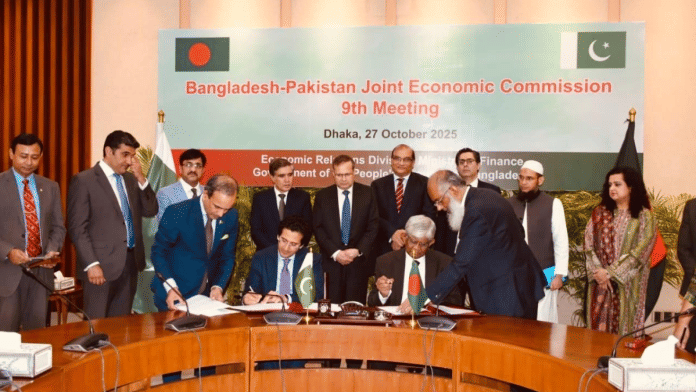New Delhi: Bangladesh and Pakistan have revived their Joint Economic Commission (JEC) for the first time in two decades, amid a thaw in ties that were frozen by historical tensions.
The meeting, held in Dhaka Monday, saw Islamabad express particular interest in importing jute—a move that comes even as India remains the largest importer of raw jute from Bangladesh in 2023, accounting for nearly $95 million in trade value, according to trade data.
Earlier in August, India imposed port restrictions on a wide range of Bangladeshi jute products, a move officials justified as necessary to protect domestic industries they say are being undercut by Dhaka’s export subsidies.
After India restricted the import of jute products via land routes, Bangladesh’s export earnings from the sector plunged to just $3.4 million in July, down sharply from $12.9 million during the same month in 2024.
Bangladesh responded by stopping yarn imports from India through the Benapole, Bhomra, Sonamasjid, Banglabandha, and Burimari land ports.
On Monday, the Pakistan delegation proposed to allow Bangladeshi entities to use Karachi port for export of jute products.
The ninth session of the JEC, last convened in 2005, was co-chaired by Bangladesh’s Finance Adviser Salehuddin Ahmed and Pakistan’s Petroleum Minister Ali Pervaiz Malik. Officials from both sides discussed cooperation across trade, agriculture, information technology, energy, pharmaceuticals, and maritime transport.
Adviser for Finance Dr. Salehuddin Ahmed hosted a dinner in honor of Minister for Petroleum Mr. Ali Pervaiz Malik and his delegation. The Adviser welcomed the delegates and hoped for constructive deliberations during the JEC session which is taking place after the gap of 20 years pic.twitter.com/5rbJ5deWXe
— Pakistan High Commission Bangladesh (@PakinBangladesh) October 27, 2025
“This is a very important meeting. After 20 years, we’ve resumed our economic dialogue with Pakistan, and it has been a very successful one,” Ahmed told reporters after the meeting. “Cooperation in agriculture, IT, maritime transport, and other sectors will benefit both nations.”
Malik hailed the talks as a “milestone in rebuilding economic cooperation,” emphasising the need to “expand beyond jute and explore new areas like agriculture, pharmaceuticals, and energy.”
The two sides agreed to establish focal points in key ministries, including civil aviation and maritime affairs, to monitor progress and follow up on agreed projects. No specific trade targets were announced, but both delegations described the discussions as “constructive” and committed to making tangible progress before the next JEC session.
Balancing act
The warming ties with Pakistan come as Bangladesh navigates a sensitive regional balancing act, especially amid strained relations with India. Over the weekend, interim leader Muhammad Yunus drew criticism after gifting Pakistani general Shamshad Mirza, the Joint Chief of Army Staff, a book whose cover appeared to show a map of Bangladesh that included parts of India’s Northeast.
In April, the two countries held their first foreign secretary-level talks in nearly 15 years. Soon after, Pakistan’s Deputy Prime Minister and Foreign Minister Ishaq Dar met the foreign minister after a decade, during which he controversially claimed that “all issues of 1971” had been settled.
Bangladesh swiftly rejected that assertion. Foreign Adviser Touhid Hossain reaffirmed that a formal apology, the repatriation of stranded Pakistanis, and the division of pre-1971 financial assets remain unresolved. “We acknowledged that the issues of 1971 cannot be solved in a day,” Hossain had said. “But we agreed to keep the conversation going.”
(Edited by Tony Rai)
Also Read: Clashes follow signing of July charter in Bangladesh, student-led NCP refuses to join






